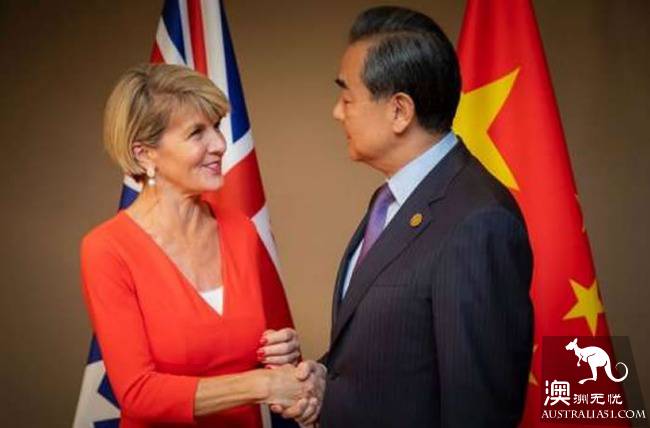Angela. Merkel (Angela Merkel) is the leader of America`s most important ally. It should be said that Germany is an ally of the United States and a democracy, and there is a clear difference between Germany and China. Moreover, China`s high-end industries are now challenging Germany`s leading position in manufacturing.
But today Merkel talks with Beijing`s leaders in China to promote German innovation and technology in Shenzhen.

It is well known that Australia-China relations are seriously off track; in some ways, China-Australia relations have fallen to their lowest level since the start of diplomatic relations in 1972.
India is an increasingly important partner for the United States, but earlier this month it prevented Australia from rejoining the military exercises of India, the United States, Japan and Australia. Why? We are seen as an outlier of America`s allies, with the most extreme against China views, while India wants to build a positive relationship with its neighbours.
Japan has set aside its differences with China over the East China Sea, when Prime Minister Shinzo Abe held a trilateral summit with China and South Korea this month. In the face of Trump`s trade stance and his impromptu performance to North Korea, China and Japan both chose the gesture of friendly negotiations.
Australia, however, has done nothing.
If I were the current foreign minister, my remarks on the South China Sea would be with Julie. Bi Xiaopu (Julie Bishop) has the same idea that Australia will exercise freedom of navigation in accordance with international law, but we do not want tensions to rise. I will hope that the parties to the dispute will settle the problem peacefully and must abide by international law, including the United Nations Convention on the Law of the Sea and so on.
However, the current freeze in Sino-Australian relations is not due to substantive differences. We are not looking for opportunities as aggressively as Germany, India and Japan. On the contrary, statements that appear to please Trump government have deprived us of the opportunity.
Australia`s inflated rhetoric about China actually began before Malcolm Turnbull (Malcolm Turnball) `s anti-overseas influence legislation in December last year. In a speech in Singapore in early 2017, Bi Xiaopu questioned China`s leadership on the grounds that it was not a democracy. Tom Rizzer (Tom Switzer) pointed out in the Sydney Morning Frontier that it was self-Billy. For the first time since McMahon`s (Billy McMahon), we see the differences in China`s polity as an issue in bilateral relations. Until then, whether coalition government or Labour government came to power, we had never raised a problem.
In June last year, the Prime Minister called on the US military to attach importance to our region. It is Australia that says it hopes to have a stronger military force in Asia to effectively contain China. Hugh. White (Hugh White) says Australia is going further than any other American ally, including Japan. However, the United States has ignored such statements.
When the Prime Minister announced his foreign interference legislation on December 7, he could have stated according to the official statement that it only protects Australia`s sovereignty and does not target any country. Instead, he misrepresented the slogan Mao Zedong proposed in 1949 and changed it to "the Australian people stood up."
It was supposed to be a cool speech, but it was completely unnecessary, and it turned into a state of great significance to us.
No American ally, whether Japan or any European country, believes it is necessary to abandon China`s relations in its diplomatic strategy. American partners, such as India or Singapore, will not do the same.
Earlier this year, the prime minister and foreign minister appeared to be trying to keep things under control. However, there is a new era in which colleagues speak unmistakably. Deputy Prime Minister Barnaby. Joyce (Barnaby Joyce), referring to China, said, "any country capable of surpassing you is always a bigger threat." A newly appointed minister, Concetta Fierravanti-Wells, criticised China`s aid plan in the Pacific. Aid disagreements could have been exchanged through dialogue, not openly.
You can`t understate the Chinese by saying "Oh, it`s just Joyce" or "Flavandy Wells is just a junior minister." Assuming a senior Chinese leader makes such remarks in Australia, it is not hard to imagine what nationalist indignation we would have. We will not accept similar insults from any other country to ourselves. In diplomatic relations, words are bullets.
At least we should say roughly the same thing.
None of these issues requires Australia to abandon its position on the human rights issue in the South China Sea or China, nor to give up vigilance over potential espionage or threat national security.
But from Gough Whitlam (Gough Whitlam) to Tony Albert (Tony Abbott) government, we have been looking for a realistic, national-based China policy. In Howard (John Howard) `s words: seek common ground while reserving differences. Now, that means defending the international trade order and working together to bring about the denuclearization of the Korean peninsula.
Does the rise of China and the decline of the United States make it difficult to implement? You can ask Merkel. She sees mature diplomacy as an ally of the United States as well as a partner with China. Of course, negotiations are also needed if necessary.
This is called the art of intercourse. In terms of diplomacy with China, from Whitlam to Albert, we have used it and seem to have worked it out.
(former author: Bob Carr, Dean of Australia-China Relations Institute, Sydney University of Science and Technology, former Governor of New South Wales, and former Federal Minister for Foreign Affairs of Australia. The original text was published in the Sydney Morning Front on May 24, 2018. This article is authorized by the original author, Chinese translation: sound)

